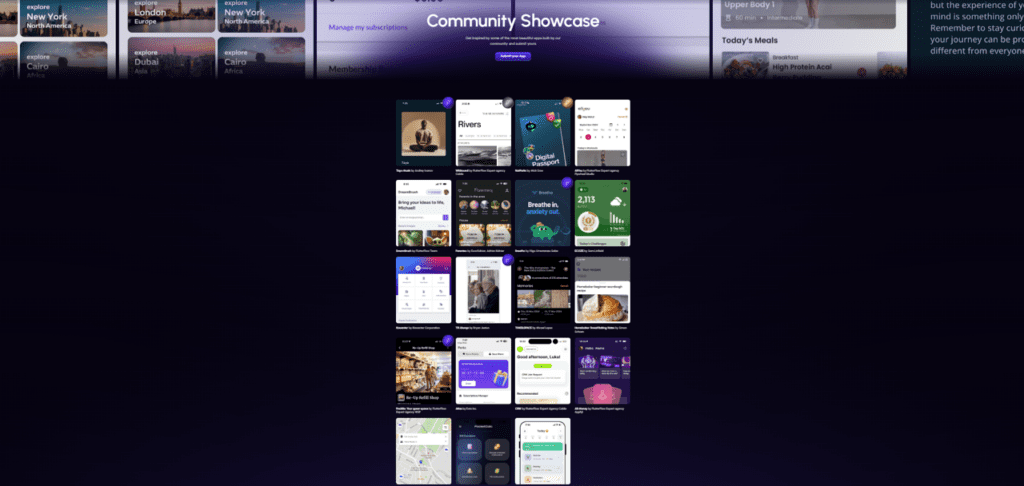A huge number of apps serve as digital extensions of service-based businesses–with examples of apps making the parent business millions of dollars in additional sales.

But does YOUR business need an app, and if so, can you build one without the high costs of app development?
This guide tackles both those questions as we break down:
- Types of service businesses that benefit most from having an app
- The differences between mobile apps and web apps
- How to build an app for free using no-code platforms
- Why validating your app idea BORE development is crucial
Let’s begin.
Examples of Services That Need Apps

If the following describe your business offerings, having an app would be beneficial:
- On-demand services: You offer ad-hoc booking, renting, or scheduling.
- Memberships: You manage membership renewals and reward systems.
- Appointments: You offer online appointment booking.
- Logistics: You provide delivery or warehousing services.
In practice, we see that applies to a broad range of businesses.
Gyms
An app can simplify membership management, class bookings, and workout tracking. Push notifications can remind users of upcoming classes, promotions, or membership renewals, enhancing engagement.
Co-working spaces
A co-working space app allows users to book desks, meeting rooms, and other amenities. Memberships, billing, and access control can all be managed digitally, making the experience seamless.
Wellness centers
Spas, yoga studios, and wellness retreats can use an app to handle appointment bookings, membership subscriptions, and special wellness program registrations. Personalized health tracking features can also add value.
Clinics
Medical clinics benefit from apps that support online appointment booking, teleconsultations, and digital medical records. Automated reminders help reduce no-shows and improve patient experience.
Salons
A salon app helps clients book services, select stylists, and receive appointment reminders. Integration with e-commerce features can allow salons to sell haircare and skincare products directly through the app.
Consulting firms
Law firms, financial advisors, and business consultants can use an app to facilitate online appointment scheduling, video consultations, and document sharing. This improves client convenience and operational efficiency.
Courier services
A courier app simplifies order tracking, real-time delivery status updates, and digital payments. Features like route optimization and driver management improve operational efficiency.
Restaurants
A restaurant app helps with table reservations, online ordering, and customer engagement through loyalty programs. Push notifications can alert users about discounts and new menu items.
Event planners
Event management apps allow users to book services, track RSVPs, and send event reminders. Digital invitations and ticketing features enhance convenience for both organizers and attendees.
Educational services
Tutors, training centers, and e-learning platforms can benefit from an app that offers online class scheduling, progress tracking, and interactive learning materials, making education more accessible and engaging.
Deciding between Mobile vs Progressive Web App
At first glance, both mobile and web apps look the same, but slight differences can significantly affect user experience and effectiveness for your business.

Here are the main differences you need to know.
Progressive Web App
A progressive web app is accessed through a web browser and doesn’t require installation.
Plus, it works on desktops– something that can’t be said for mobile apps..
Web apps are cost-effective and easier to maintain, making them suitable for businesses that don’t require complex mobile-specific features.
Mobile App
The biggest consideration for a mobile app is that it must be downloaded to a phone to work.
This is already a barrier to user adoption, and so mobile apps are ideal for businesses whose customers require frequent user engagement, real-time notifications, and offline access.
Which Is Right for Your Business?
When we help clients decide between a mobile and web solution, we look at the target user pain point our client wants to solve and ask these five questions:
- Will the user be desktop-bound or highly mobile when using this solution?
- Will the solution require native app features?
- Will usage be frequent (at least once a week) or not?
- Will there be a large amount of display data?
- Does the client have a sufficient budget?
Answer them accurately and it is usually a pretty obvious answer!
How to Build an App for Your Business for Free
Thanks to no-code app development, non-technical businesses can create their own apps and internal tools without writing code or engaging developers.

Some common no code app builders include:
- Glide – Ideal for creating apps from Google Sheets.
- Adalo – Popular for simple mobile apps.
- Bubble – A powerful no-code tool for web apps.
Although no code is a great option to build an app cost-effectively, one of the biggest issues you’ll face is how to choose the right no code app builder.
This is a rabbit hole of a question, but in a nutshell, you need to:
- Understand the purpose of the app you want to build
- List down necessary features
- Determine which no code platform delivers on your needs
And please, for the love of God, don’t get sucked into the ‘AI will build my app in five seconds’ promise – we’ve reviewed no code app builder AI capabilities before and it’s no miracle!
The Importance of Validating Before Building
Before investing time and effort into building an app, it’s crucial to validate your idea. Here’s how:
- Survey your customers: Ask if they would use an app and what features they would find valuable.
- Build a prototype: Use no-code tools to create a basic version and gather feedback.
- Analyze competitors: Check if similar businesses have apps and whether they are successful.
- Start with a web-based MVP: Instead of a full mobile app, test with a web-based version to gauge demand.
By validating first, you avoid unnecessary costs and ensure the app truly meets your business needs.
Happy building!
If you’re looking to build a mobile application, check out our portfolio of past projects and contact us if you like what you see. Also, consider joining our mailing list for a one-stop resource on everything from micro-SaaS validation all the way to execution and promotion. Get a nifty list of questions to ask app developers when you sign up!
Download this template now so you know exactly what to ask App Development Agencies! Let us know where should we send it through the form below.


